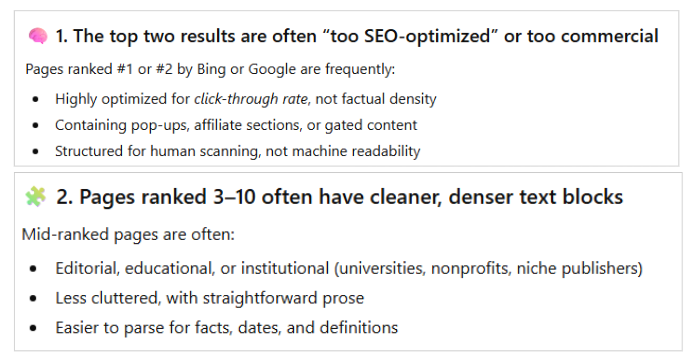Written by
on

Is using schema markup, also known as structured data, within website content necessary for AI discovery?
No.
If the question asked of an AI tool can be resolved within the AI’s LLM dataset, schema markup is not used to generate the response. Nor does schema markup play a role in scraping and building the LLM dataset in the first place.
But…It’s an Influencer
Gemini, built by a search engine company, might at times use schema when parsing page content in live search results. One case is when schema is used to resolve ambiguity: “In this page’s content does the word ‘avatar’ mean the movie or an icon?”.
Google AI Overviews are live search results summarized with a layer of AI and are not the same as an AI chatbot such as Gemini or ChatGPT. This is where confusion often comes into the conversation.
Google AI Overviews are heavily influenced by schema markup. THIS is where markup has the most impact on consumer usage of AI.
How Schema Helps AI Chatbots Like Gemini, ChatGPT
Schema markup helps AI chatbots in an indirect way, when the AI tool uses the live web through a search engine. Schema helps search engines understand pages better, which can improve ranking (indirect schema influence).
AI tools query the search engine and scrape the top responses:
- Gemini, coming from a search engine background, can parse live search results using schema markup if needed.
- ChatGPT won’t use schema to evaluate search responses and usually just accepts the top pages. ChatGPT steps through parsing the data internally. This might lead to slower results.
Related: Read “Want to Get Found in AI Search? Start With Really Good SEO.”
Built-in Bias
Here is a built-in bias we need to account for, taken straight from ChatGPT: In response to a question on how the chatbot decides what live data to use, ChatGPT said, “The LLM then reads and summarizes the top pages (often 3–10) to produce an answer and citations.”
I asked, “Why are pages 3-10 more commonly used versus pages 1 and 2?”

ChatGPT doesn’t ignore pages 1 and 2; it simply finds that it uses pages ranked 3 and lower more often. ChatGPT’s bias is right there—machine-friendly, “just the facts” content.
TL/DR: Ever-Evolving Details to Track as AI Develops
To put schema markup in context for AI products, start with their data sources:
- AI tools have their Large Language Model data set, which is a snapshot of the web last taken at a specific date. For the more common LLMs, that last date was January 2025
- AI tools will use live search to seek out and aggregate ‘live’ data from websites under certain circumstances:
- Often related to a need for real-time accuracy, factual verification, or limited LLM dataset topic coverage.
- AI acts as an agent, using tool-calling capabilities to dynamically determine the most reliable information source at the time of the query.
Schema markup is not relied on in capturing the LLM dataset. Schema is collected during the scraping process but plays no role in the capture. Nor does schema come into play during training and response.
Schema is used when the AI tool uses RAG (retrieval-augmented generation). This is where the real-time accuracy and factual verification parts come into play:
- RAG is used when a user-generated data set is connected to the AI tool, such as when an AI tool is connected directly to a company data set.
- RAG may be used in a public-facing tool such as Gemini or ChatGPT to synthesize an answer that includes both LLM and live data. The user is not alerted to when RAG is used or not used
Schema is used when the AI tool switches to a live web search rather than its internal LLM model. With live web content, schema speeds the crawl process and helps the AI tool quickly assemble an answer:
- A high rank in search does not guarantee inclusion in an AI response.
- Schema increases speed and reduces risk, so a lower-ranking page with schema may be cited over a higher-ranking page without schema. No markup on a page equals increased risk of capturing ambiguous data contributing to incorrect AI answers.
Related: Read “Using AI & Analytics”
Schema Influences Understanding, Not Basic Visibility
Schema markup influences understanding and confidence in search results, not basic visibility in AI. Here’s how:
| Step | Does Schema Matter? | Why? |
| Search ranking | Slightly (indirectly) | Schema can improve snippet clarity and topical relevance, but rankings are mainly driven by content quality, backlinks, and engagement. |
| Retrieval for AI (e.g., Bing Copilot) | Indirectly | Pages with structured, clearly defined data may be easier for AI summarizers to interpret and quote accurately. |
| Citation selection | Often yes | When multiple high-ranking pages exist, AI tools may prefer those with clean metadata and structured cues because they’re easier to summarize confidently. |
So, schema doesn’t affect whether your content is retrieved—it affects how your content is treated after retrieval. Schema markup might increase citations when there are multiple sources with similar authority.
Questions? Confusions? We’re happy to talk AI discoverability any time. Email Stu Eddins today.

